ASBO
Solidarity and its Discontents?
Riots, Rebellion and Repression in Bristol 2011-2023
Joy, Freedom, Retreat and Capitulation: Kill the Bill and Bristol
Solidarity without preconceptions: sharpening perspectives
Incarceration and solidarity: Kill the Bill Prisoners and related struggles
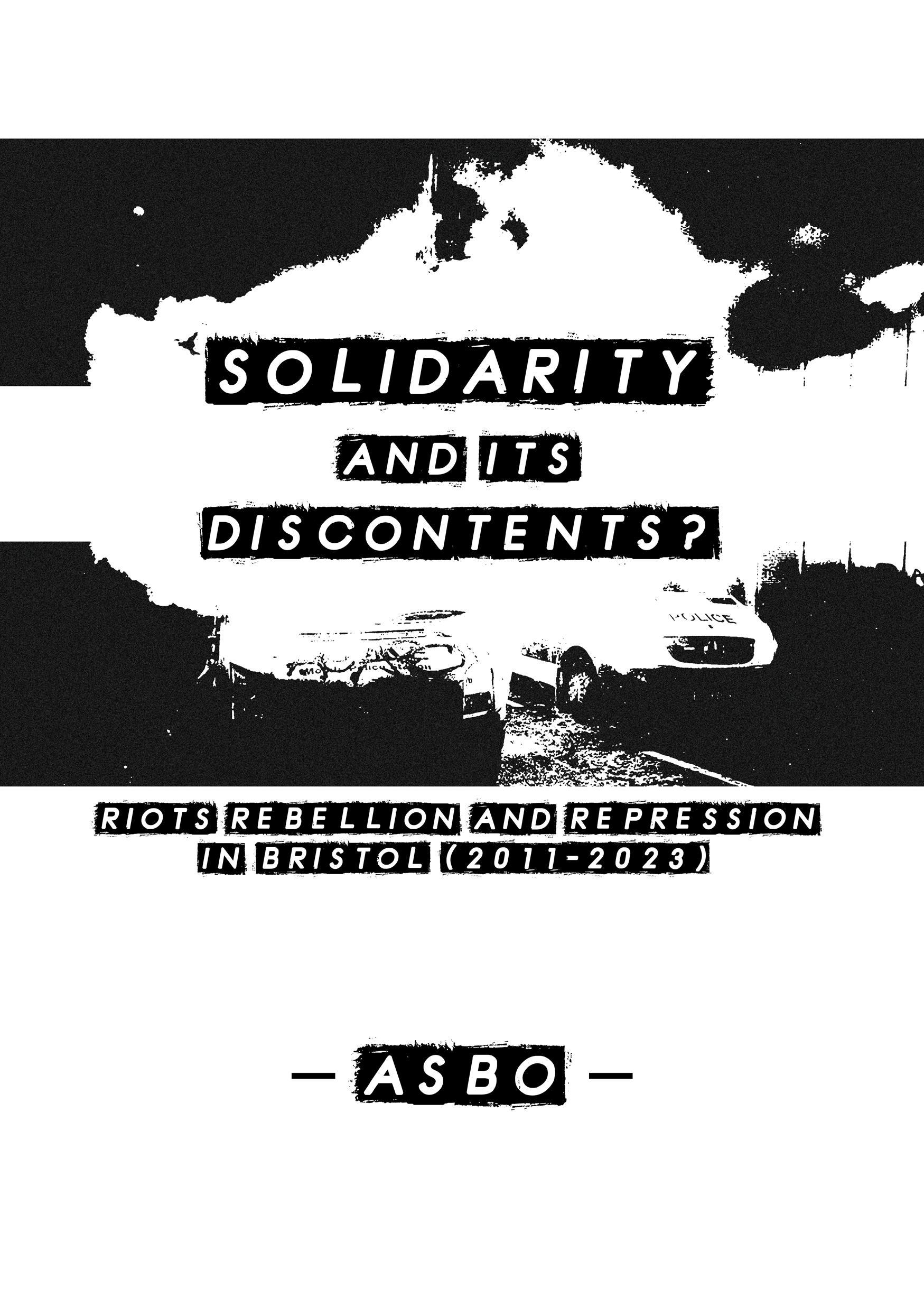
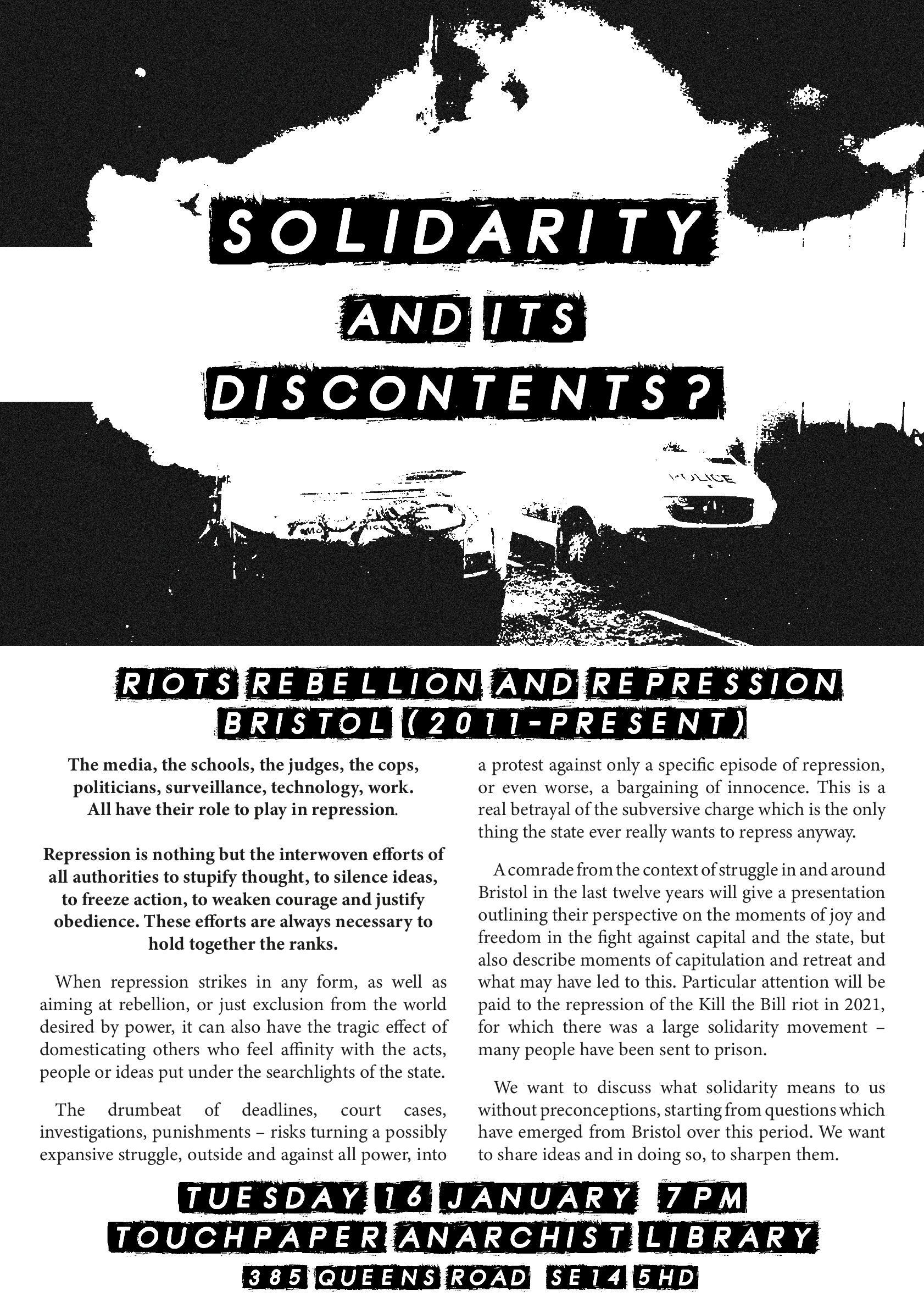
The media, the schools, the judges, the cops, politicians, surveillance, technology, work. All have their role to play in repression. [1]
Concepts and practices such as repression and solidarity have become amorphous and widespread. (I would also add ‘abolition’ to this stack of buzz words, but that might just be my 2p).[2] As with any word that conveniently describes a complex phenomenon (see also gentrification, ‘burn-out’, ‘trauma’, ‘affinity’ etc.) they are both a help and a hindrance. All these words are difficult to discuss because they combine personal experiences with repressive practices deliberately designed to divide and diminish.
Repression is widely accepted by anarchists as a full-on and systemic issue that happens due to all the agents and systems outlined by Touchpaper above. However, the responses and reactions to repression can be very difficult to discuss, and highly emotive. In the face of brutality, how can methodologies for responding to the state (and related institutions) be questioned without seeming callous? When the subject of the conversation is incarcerated people, how can the issues surrounding their support be questioned without seeming to be uncaring or arrogant? This tension (and desire to explore it) is one of the main motivations for this article and related discussions.
There is a second major reason why these topics can be so fraught or daunting to investigate, and that is in how to discuss them. Repression can feel like something to desperately avoid, as it feels unsafe both emotionally and technologically. There can sometimes be a visceral repulsion to it, an acute desire to escape it (I say this without judgement and as someone who has felt this on multiple occasions). As the quote from Touchpaper above highlights, repression always includes surveillance. So, how is it possible to discuss the ideas and tactics that can help survive repression when it hits, without exposing the cracks that can emerge under the weight of it? How to investigate and question responses, without exposing wounds and scabs to those who profit from them and seek to exploit them?
It is for these two reasons that so often discussions around repression don’t happen, and if they do, they get shut down…. But this multi-layered self-censorship only serves those who benefit from repression.
I’m hoping that my perspective, as someone who has been both the visited and the visitor, as someone who helped set up Bristol Defendant Solidarity (BDS), but who has also been supported by the group, can provide some clumsy musings on some patterns and issues that I feel have arisen over the last 12 years in Bristol. I am using Bristol because it is where I live, and the place I understand the most. But I think that (sadly) some of the issues included in this text can be more generally applied.
This is a messy starting point to address these issues – an attempt to unpack and explore how people can effectively end up policing themselves. No one is immune from the powers of the state, or the type of strange peer-pressure that arises from the entangled and sometimes conflicting networks that interlink through prison-related struggle. People are messy, especially when facing repression. When people come together based on solidarity focused on individuals rather than ideas and actions, it can create some pretty strange dynamics.
This article is an attempt to provoke discussion and create a moment to reflect on how solidarity can become formulaic, or at worst, suffocating. It is meant to accompany a couple of events, and to be a starting point for in-person discussions. I want to ask questions without being written off as divisive (I use this word deliberately, as it is so frustratingly powerful in shutting down conversations), or dogmatic. The article is quite long as it is a big subject!
In Conflict is Not Abuse, Sarah Schulman wrote: “Unresolved trauma is so often a prison of inflexibility”[3] and I hope that this text will help to break down this inflexibility, or at least act as a gentle suggestion to poke it a bit!
“Open thinking points beyond itself [and] is more closely related to a praxis truly involved in change than a position of mere obedience” – Theodore Adorno, quoted in Cindy Millstein[4]
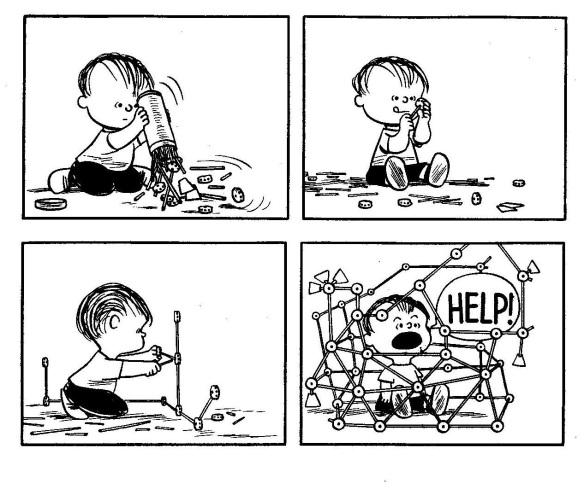
This praxis can be a useful way to look at repression. In this context, “obedience” can relate to the continuation of certain practices without having the time, energy, or affinity to think of other tactics.
This isn’t a personal attack. I have experienced myself the drudgery and sustained impact of a prison sentence and ongoing legal struggles. I know how it feels to be in conflicts connected to prison which have a grim, public perspective, and how hard it can be to continue when you want to hide. But from here on in, things are only going to get worse in terms of state repression (and increased lack of access to legal information…) so, there has never been a better time to start looking at what is meant by ‘solidarity’ in this context, and how it is conveyed.
“May our mistakes serve others who are passionate and love the beautiful moments of confrontation against power, which are where we feel most alive” – Francisco and Mónica [5]
“It’s vital that we learn from the past and recognize our tendencies to repeat our mistakes” – Beyoncé
When repression hits, the weight can feel suffocating, all-encompassing. Looking honestly at the mistakes that arise in response to it in an honest but fiery way is surely one of the best ways to counter repression. The not-talking leads to restless nights in cells, to responses based on ego and bluster. Without incriminating ourselves or others, it is possible to carefully pick a path, and to stumble forwards. The minutiae of individual cases are not important here – and, suffice to say, it’s best left to conversations among comrades – but hopefully the broad strokes of ideas will help “serve others who are passionate and love the moments of confrontation against power”.
Discontent /dĭs″kən-tĕnt′/
Discontent is a noun, an adjective and a verb. Discontent is
-
lack of satisfaction with one's possessions, status, or situation : lack of contentment:
-
a sense of grievance : dissatisfaction
-
a restless aspiration for improvement
-
to make dissatisfied or discontented
-
one who is dissatisfied or discontented : malcontent.[6]
All of these meanings will resonate with anyone who has engaged with prison related struggle. It is always going to be frustrating. Every aspect of prison is designed to alienate, to quell, to contain. Anyone in prison with an ounce of rebellious spirit will have a “restless aspiration for improvement”, “a lack of satisfaction” with all the areas outlined above, and a “sense of grievance”. However, despite the difficult matters that arise from systemic discontentment, there are always beautiful moments. Most of these have something to do with solidarity – when it is at its most genuine and unmediated. Solidarity that springs from the heart, not the spreadsheet. With recent uprisings in Ely, Niddrie, and in many prisons, there will always (thankfully!) be many more people resisting that are unconnected to anarchist struggles and the activist project of cataloguing cases. Of course, connections among people and cases can give strength and amplification to individuals incarcerated, but when solidarity becomes stagnant, restrictive, or formulaic, it is vital to take a step back and unpick it. In Armed Joy, Alfredo Bonanno famously wrote:
“Play is characterised by a vital impulse that is always new, always in movement. By acting as though we are playing, we charge our action with this impulse. We free ourselves from death. Play makes us feel alive. It gives us the excitement of life. In the other model of acting we do everything as though it were a duty, as though we ‘had’ to do it.” [7]
May Bonanno’s words live on in our actions and in our hearts!
Joy, Freedom, Retreat and Capitulation: Kill the Bill and Bristol
In order to highlight the fight against capital and the state, I will refer to two beautiful moments of rebellion (and related repression and struggle) that happened in Bristol, a decade apart. The Stokes Croft (or ‘Tesco’) riots of 2011 and the ‘KTB’ (Kill the Bill) demos and unrest in 2021. What lessons can anarchists learn from the state responses, and the increased use of what has been called the “political use of riot charges”? How do the current methods and tactics used in prison solidarity (and for anyone facing repression) relate to anarchist struggles? These are big questions to bear in mind….
Firstly, some local context. In 2010, ‘Bristol Arrestee Support’ was set up by a small group of comrades. In 2011 it grew quickly in the immediate aftermath of the Stokes Croft Riots and became ‘Bristol Defendant Solidarity’. Fast forward to 2021, when the ‘KTB’ demos and riots happened, and what began as an informal attempt at resistance to repression has become a Bristol institution (though often, as with many institutions, it’s only really run by a few people). BDS has worked with people all over the South West. After it had been going for a few years, it started working closely with Bristol Anarchist Black Cross (ABC) which had existed in various guises for many years before BDS. I won’t go into the processes of how the groups interact here as it is not for me to say. However, it is also worth noting that since 2021 there are two other formal groups organising around similar struggles in Bristol: Bristol Anti-Repression Campaign (BARC) and Justice for Bristol Protestors (JBP). I cannot emphasise enough that this isn’t meant to be an attack on any of these groups. It is a space for reflection, and trying to highlight some themes and issues that might be comparable in other spaces and terrains.
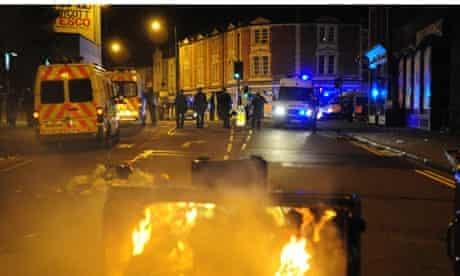
The aim isn’t to cause division, or an attempt to diminish the importance of organising with incarcerated people. I know that some of the practices and events that I am including here have been set up with the direct request and involvement of people inside, and I don’t want to diminish people’s autonomy or personal messages.
Solidarity without preconceptions: sharpening perspectives
“Bristol Defendant Solidarity is an independent group run by local volunteers, formed after the Stokes Croft riots in April 2011. We aim to provide effective, lasting unconditional support and solidarity to anyone arrested or imprisoned as a result of demos, riots, direct action and escalating class war. We also stand in solidarity with all people facing harassment from the state – whether that is a “random” Stop and Search on the street, or dawn raid as part of their investigations into “subversive” groups. We take a clear stand against state repression and police brutality.”[8]
This quote is from the home page of BDS. It highlights for me some of the tricksy things around the group today. Firstly, what it omits: ie. no mention of anarchism or anarchy. It is arguably alluded to in the “subversive groups” phrase, but it lacks an explicit anarchist message or frame of reference. Some might argue this is unimportant, but without this there is a real danger of sliding into welfarism. Secondly, I am really unsure of what is meant by “unconditional solidarity”. Promising unconditional solidarity seems ultimately meaningless, even if it is just unconditional solidarity whilst someone is navigating the legal system. There are numerous instances I can think of in which this unconditional legal support has led to a lot of understandable bad feeling and tension in the group. I won’t go into the specifics of this here as it is not appropriate, but it is vital that this is acknowledged, as it has led to hurt, and issues around discrimination.
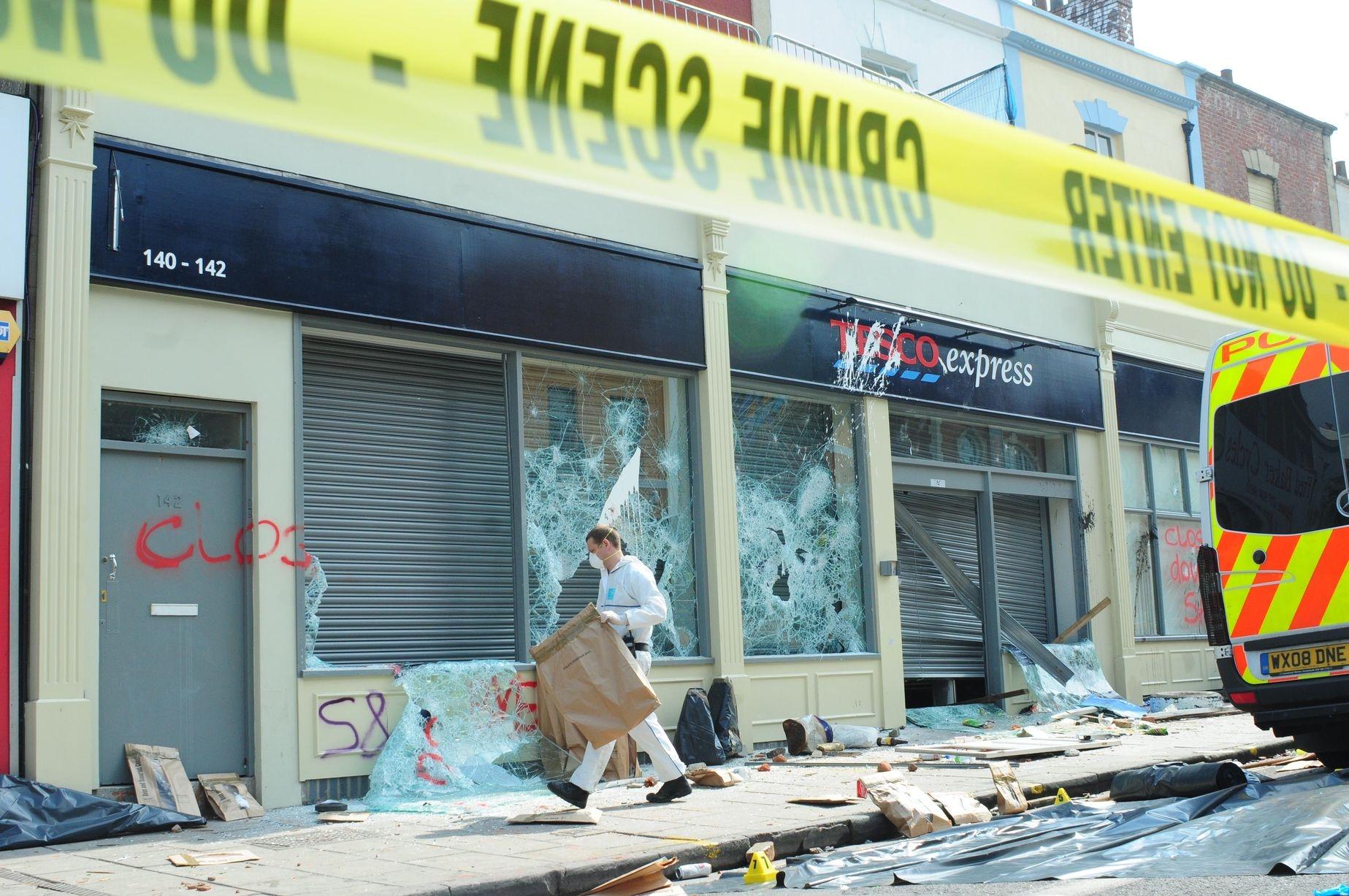
I have many friends, comrades, pen-pals and others who I express consistent solidarity with. But it is never unconditional. All humans can be arseholes sometimes… whether ‘on the out’ or ‘banged-up’. Everyone perpetuates harm and just because I have solidarity with someone on the street, doesn’t mean that I have affinity with all their actions. We are all constantly learning, and having critical and honest relationships to each other is part of this process. My solidarity is never unconditional, and I wouldn’t ever want it to be.
Many writers have spoken of the concept of ‘critical solidarity’ and I guess this is as good a frame work as any. I included the quote from BDS as an example of what I feel as a general trend around prison-related organising and struggle, not because I want to seem uncaring or disrespectful to the collective. It is the danger that comes from putting anyone on a pedestal, of making heroes out of people in prison (or ex-prisoners). It is why anarchist methodologies and analysis must be at the heart of prison struggle; otherwise it becomes noise, and the ability to be critical gets lost because it implies a personal attack on those in the ‘prison milieu’.
“How do we practice a solidarity that’s compassionate and revolutionary: walking side by side and tangibly undermining white supremacy with each step?” – Cindy Millstein[9]
Cindy Millstein’s question equally applies to all forms of repression (not just white supremacy, but the courts, prisons and related institutions). To me, the only way to have a solidarity that is “tangibly undermining” a system of control, is through some form of rigorous and ongoing analysis of methods, approaches and motivations.
We all live under capitalism, and that means we are all doomed to repress and be repressed. The binary categories of ‘victim’ and ‘hero’, are not helpful here. In a framework of critical solidarity, there is no space for martyrdom. The best way to counter the piercing light of repression is to shine in on ourselves: to gently investigate together, and to feel confident in our comrades and our ability to respectfully address our individual strengths and weaknesses. This way, when repression hits, there is little ammunition for the state.
All this is to say, that I can have solidarity with someone and wildly disagree with them. I can respect the resilience and rebellion of someone who has endured life inside prison for many years, whilst challenging views they might have that ‘kick oppression down the line’ and inflict discrimination on other people. I can have huge amount of respect and solidarity for friends and lovers who have weathered the infiltration scandal with me, but I can wildly disagree with their methodologies and perspectives. No one should be above scrutiny if their solidarity denies, disempowers or impedes the autonomy of others involved in struggle.
As Action Directe said, in 1977, “Up against this reality [repression] solidarity is in motion, and it seems this is a concept we can use, perhaps our chance to get out of the dead end, to retake the initiative and not sit and wait for the blows. But from what place can we understand solidarity? How can we see it? How useful can it be in practice?”[10]
If solidarity is to provide some kind of map to get out of the dead ends, it is essential that it is questioning, vibrant and evolving. Solidarity without formulas. A solidarity born of love, of fierce, critical love.
Solidarity and Surveillance
Since 2021, many many mug shots relating to the KTB demos have been circulated at various different points by the police and the Bristol Post (or “The Pest”). It’s worth noting that this practice has been done by the paper for many years (including in the aftermath of the Stokes Croft Riots of 2011, and at various subsequent, unrelated demos – for example the Black Lives Matter protest in 2020 when the Colston statue came down).
The attitude towards cameras is one of the starkest ways that the riots of 2011 and 2021 can be contrasted in my mind. In 2011, journalists were fair game to be chased and cameras contested. With a few notable exceptions, people were mostly masked up. And those who weren’t paid a heavy price… Fast forward a decade and images of riot litter people’s social media profiles. Selfies by a burning cop van….
These pictures and posts have been gold to the state and the onslaught of cases it brought against individuals after that night in 2021. I am aware in these things I am a Luddite. But how did it change so quickly? When speaking to people facing trial, I tried to emphasise the changing nature of surveillance. It is easy to think of it as something external. Infiltrators, the FIT team [11], and journalists are much clearer targets than other people fighting alongside you on the street. When cameras are all around us, and there is no affinity or agreement on their use, repression’s tentacles envelop from all sides. The cop in our head becomes the cop in our hand.
Many people were arrested in the days that followed. People are still being arrested and picked up today.. Pictures of ‘wanted’ people are still being published, and the maniacal Judge Patrick continues to dole out sentences. Patrick is the singular, despotic judge who ran the first 20 KTB trials (and sentencing) in the Crown Court. His obsession with being the only judge to rule all the cases caused big delays for defendants. Eventually (due to illness and simultaneous cases) he reluctantly handed some cases over to Judge Matthews (in the Magistrates Court) for plea hearings. For further grim similarities between 2011 and 2021, it’s worth noting that Judge Patrick has a long history of obsession with riot cases, and even ran a 24/7 court system at Wood Green Court in London in 2011 after the London riots. In both 2011 and 2021 there are striking similarities between the media circus around all the defendants, which Patrick has undoubtedly had a hand in.
Repression is nothing but the interwoven attempts of all authorities to stupify thought, silence ideas, to freeze action, to weaken courage and to justify obedience. These efforts are always necessary to hold together the ranks.[12]
Understood in this way, repression is a form of suffocation. There is a peculiar and quite specific form this takes on this messed up island. Beyond the blading and baton strikes, the dogs and tasers, there is a more insidious, long, protracted form of repression which ties people up in knots, and slowly but surely leads to obedience. The phrase “the ranks” in the quote above could seem unclear or divisive (who are “the ranks”?) but I understand it as the way in which everyone who is affected by repression contributes to it unconsciously by performing a set response to it. We all do it at times. It’s what can so easily (and often inevitably) happen when following the rules of engagement with the legal system and other forms of authority. And nowhere is this method of suffocation through protracted interaction with the state more established than the specific methodologies of policing and legal wrangling in these islands.
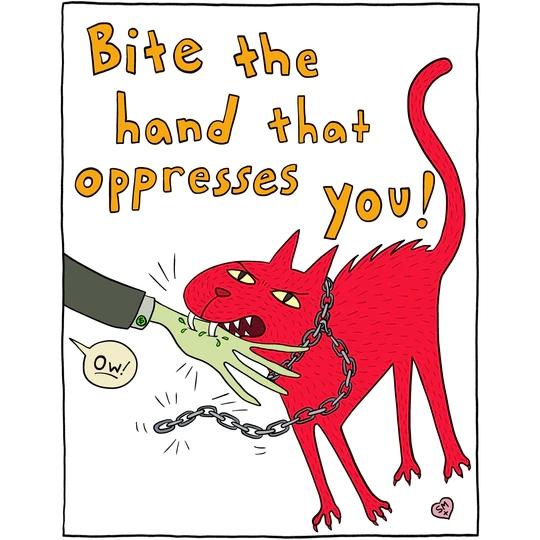
Since the arrests in 2021 (and ongoing) there have been multiple petitions, campaigns and call-outs outlining the brutality and the physicality of repression. The dangers of this ‘good’ and ‘bad’ narrative are always waiting in the wings – a spectre that threatens meaningful discourse and affinity with a sterile analysis borne out of an emotive response to specific instances of repression, and makes it hard to challenge without seeming dispassionate, or uncaring. This tendency is applicable far beyond Bristol. All the above comments can apply to the cases of infiltration (and exposures in England) and subsequent ‘Under Cover Policing Inquiry’. The personal fallout from this has been huge (I say this as someone who has been deeply affected by it, and experienced conflict because of this). The dominant narrative around the infiltrators has often used very gendered arguments, and the Inquiry remains a huge breadcrumbing exercise by the state: giving just enough morsels to keep folk tied up and hanging on. I write this as someone who would love to know what’s on my file (or the bits they’d choose to show me), but it is also important to honestly note how draining engaging with the state through the medium of the court is, especially in instances of the police investigating themselves (which is essentially what an inquiry is). In Bristol there is a petition currently circulating to ‘Demand a Public Inquiry into Police Brutality against Bristol #KilltheBill Protestors’, so this practice is very much ongoing today.[13]
Time and time again the perils of specialisation in the face of repression have been exposed. What is often borne out of a sense of urgency and necessity (for example, the many collectives that arose during the era of so-called “Summit Hopping”, or in this instance, BDS) can then become problematic both for those within the projects (who end up being seen as some kind of experts in their field, whether they want to or not) and those outside the collectives (with local responses and affinity getting deferred to national – or international – frameworks, and the rigidity that can accompany this).
I also think it’s important to recognise that, at it’s very worst, solidarity can have a kind of parasitic nature. Of course, not everyone is able to, or inclined, to riot and physically attack the state. Of course, many different tactics are needed to defy and resist capitalism. But I increasingly feel that solidarity can become a way to live vicariously through others who have risked more, or been caught. I don’t say this lightly, and I think this can happen unconsciously... But I do believe it happens. In the face of repression, getting caught up in small practical acts can feel empowering. But if we take a step back, is it just window dressing? Certainly at times the image and branding of the act of solidarity (or acts of assistance [see below on 'assistentialism']) can seem to attract more input and attention than anything else. The dimension of play, the search for affinity, the use of this in projects, words and acts that are hostile to repressive institutions – get relegated or lost.
The process of domestication which arises from repression is a slow but effective one. In the face of repression, it is easy to rely on set-piece responses. It can also be difficult not to end up in a form of false unity. In describing the multiform approach required to engage with white supremacy, Millstein wrote:
“There are no easy or singular responses or resolutions to white supremacy, to name one brutal adversary...nor uncomplicated ones”. [14] I think this can apply to many forms of solidarity. It is especially true of a solidarity which is not (at least initially) based on affinity and informal networks. A genuine desire to engage can become replaced with organisation and an over-reliance of specialisation.
Millstein has talked of the importance of “relational solidarities”, where trust has been built over time. This is very difficult to discuss in the face of the sharp end of repression (for example, in the case of prison-related struggle, when people are remanded, or physically injured and call-outs arise as a direct response to this). As we have seen in Bristol, affinities based on mutual aid and solidarity can easily develop over time through organising together around repression (hours in and outside court have to be good for something!). But the journey to get there is rarely smooth – and often can be easily upset when pressure is applied.
Incarceration and solidarity: Kill the Bill Prisoners and related struggles
The unrest in Bristol in 2021 has been well documented by others, but there are a few particular issues that are worth investigating here. First, the run up to the riot. In the weeks before the night of 21st March 2021 there had been numerous events around the ‘PCSC’ (Police, Crime, Sentencing and Courts) Bill: several public squats, demos and open mic sessions (outside, in the city centre). On the 23rd March there was also an attempt at a mass camp on College Green (a part of town outside the ‘City Hall’ where the council meets) that got violently evicted. During many of these events in March 2021, police from multiple forces [15] made extensive use of dogs, drones, gas, batons and shields (and notably the practice of “blading” – using the edge of the shield as a weapon).
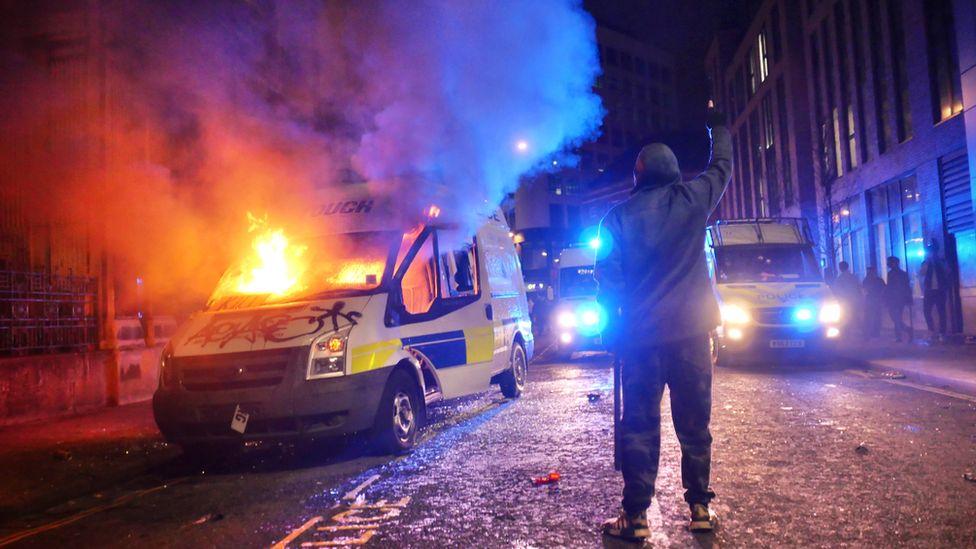
This context is important because all these events contributed to some prevailing problematic attitudes and practices. Firstly, there was a pattern of having multiple demonstrations or events on one day. Groups such as XR and others made it very easy for the police to divide these into ‘peaceful’ and ‘violent’ protests (or the threat of). Also, engagement with the police. During the day, many ‘Plastic Coppers’ (PCSO, ‘Police Community Support Officers’) were deployed. These were often seen talking to many of the self-identified peaceful protestors; so much so that a leaflet highlighting the many problems with ‘non-violence’ and ‘pacifism’ was distributed on multiple occasions.
There was also the predictable range of drink and substances being consumed during the demos. As this went on for several hours, many people were pretty wasted by the time the evening came. This is important because of two main factors. Firstly, several defendants went on to use this as ‘mitigation’ in their pleas, arguing that they didn’t know what they were doing (and in some cases even sounding quite positive about the idea of a custodial sentence as a way to detox). Secondly, from a security perspective. People were often very easily identifiable. Lack of changes of clothes and masks, combined with the inevitable deluge of body-worn camera footage from the cops, plus social media and camera content from arrestees, made it easy for the police to pick people up (and issue so-called ‘Rogues Galleries’ in the local scum media, Bristol Post, which has a long running feud with anarchists in Bristol).
In the face of this persistence by the state, combined with legal aid cuts, longer sentences, increasingly difficult access to solicitors (and barristers), how sustainable is a group like BDS? Are all anarchist legal and prison support groups doomed? Is it an impossible balance? In terms of repression and solidarity, it is vital to reflect on the ‘death of a thousand cuts’ trend that has emerged in Bristol. As is so often the case with solidarity, the path h as followed a kind of bell curve (ie. building over time and then greatly diminishing). The use of scare tactics in charges by the state (frequently applying the ‘riot’ charge to defendants and then offering plea-bargains for lesser ‘public order offences’), combined with individual trials (instead of group), has tied people up in a whirlwind of solidarity that was unsustainable in the face of the volume of cases and the extremely long bail periods people have been given. Out of this frenzy, affinities and networks grew and strengthened, but ultimately, did they really endure? Undoubtedly some deep personal connections have been made, but in terms of having the energy and fire to go beyond letter-writing and individual support, it seems from where I am that the state has made significant gains.
What was described on the poster for this article and related event as “moments of capitulation and retreat” rings true. As John Bowden [16] has stated, when engagement with prison struggle is only at the level of the pen, and resistance to prison and related structures is only ever framed around the few prisoners who get highlighted by anarchists and other groups (rather than a generalised attack against the prison system and all the institutions that support it) it will always fail to bring about meaningful change, or be a threat to the state. I write this with a heavy heart because I have felt the warmth and joy that comes when post is delivered to your cell. I have yearned for the connection that comes from knowing what’s going on behind prison walls. Writing to prisoners is one of the many ways anarchists can show solidarity to incarcerated people. And it is an important and simple way people can engage with prison struggle. However:
“It is necessary to face an unquestionable reality: prison and it’s dynamics perpetuate forms of support based on assistance.” – Complicity and Sedition [17]
In the face of repression (especially when it impacts people we love or have existing affinity with), how is it possible to balance solidarity with the practice of “assistentialism”? The latin root in the word “assistance” carries the sense of “to attend”, “to show up”. As an implicit doctrine, assistentialism takes each case as a case of need, in isolation from its wider repressive “meaning” or context, treating it as a unit or quantity of harm to be mitigated – and reducing all social action to the application of palliatives. [18]
As was outlined in Complicity and Sedition, in order to counter this tendency and doctrine it is vital to develop a more meaningful understanding of what anarchic solidarity looks like. To have not just an anarchist mindset, but also coherence. To move beyond reactive forms of solidarity. To embrace a form of attack which is expansive and vast, and which has space for many forms of expression. All too often it can feel like in the vacuum left by repression, defensiveness and miscommunication can rush in and obscure the issues. In this restrictive process, the concept of a more generalised approach to attack (and the intentions behind it) can get misinterpreted or misread as being too dogmatic or sectarian. When talking about this intention to struggle, it doesn’t necessarily mean a prescriptive form of action which is often written off as not being possible to a lot of people (for example, damage and sabotage). It is more about an approach to attack which isn’t borne out of a sense of legal necessity, helpfulness or more reactive responses, which are designed to tie people up in knots.
It is easy to see why groups engaging in solidarity in relation to all forms of incarceration (including immigration prisons or ‘Detention Centres’) end up in this predicament of joining-the-dots, of trying to keep track of who is where and what they might need. Of endlessly playing catch-up in a zero-sum game where the rules are constantly changing. Adopting set-piece tactics to desperately try to plug the gaps left behind when someone is put behind bars.
“Collective emotion is revolt whereas collective reason is the State.” – Fillipo Argenti Nights of Rage [19]
Increasingly I wonder how relevant the current methodologies are in terms of responding to repression. Certainly they are unsustainable. In Bristol we have clearly seen the dangers of this approach. At their best, groups like BDS offer a practical form of solidarity which can empower individuals and remind them that they “do not have to face the system alone”. However, at its worst this can overcrowd people, eroding previous existing affinities as people look to a group to solve problems for them. At its very worst, this type of solidarity leaves a bitter vacuum. I am not saying this to sound snide, but who decides who is ‘worthy’ of support? And what happens when this runs out? When emotion is replaced by “collective reason”, the danger of people’s well-meaning organisational approaches running out of steam – and people becoming disconnected due to a lack of rooted affinity – is high.
The drumbeat of court dates, investigations, punishments- risks turning a possibly expansive struggle, outside and against all power, into a protest against only a specific form of repression, or even worse, a bargaining of innocence. This is a real betrayal of subversive charge which is the only thing the state ever really wants to repress anyway. [20]
BDS has been a real rock for many people facing the wrath of the state (and specifically, Judge Patrick). However, it is arguable that it has at times also been a hindrance. It is very difficult to talk about these issues because the stakes are so high, but this model of legal support and solidarity doesn’t come without it’s issues. I’m sure that no one is more aware of this than those more closely connected to it (recently I have only been peripherally involved in giving random prison advice), and I hope that there will be more contributions to this discussion in the future. But meanwhile, a few observations from me….
The issues that have arisen in Bristol seem to be universal issues to do with a certain model or approach to solidarity. The analysis of issues (and prevailing attitudes) arising from Francisco and Mónica’s trial and the “Caso Bombas”, really resonated with some comments I have frequently heard in Bristol:
“The reactions (if any?) have been varied: “There is not much we can do, the sentence is already written”, “Good lawyers are urgently needed”, “But if it was them, there is no way to defend them” or “We can only add their names to the list of prisoners to be in solidarity with” are just some of the positions put forwards with a greater or lesser conviction.” [21]
These reactions are unsurprising as a knee-jerk response to an increasingly repressive legal system and all that entails. However, as Touchpaper highlighted in the quote above, this can narrow the range of tactics and expressions used to confront the brutality of the state. In this process, the “bargaining of innocence” can occur – and with it, a rise of victimhood.
Not everyone who was arrested after March 2021 identifies as an anarchist. Some do, some never have, some didn’t but now do. In lots of ways this is irrelevant labelling, but it is important to remember that everyone facing prison due to alleged activity on the nights in March 2021 had their own motivations and preconceptions.[22] The range of publicity and the language used by different incarcerated people clearly shows this, and I am not trying to attack anyone's autonomy, or the narrative they have chosen around their case. However what is clear, when taken as a whole, is that the overall culture does contain within it some “bargaining of innocence”.
The practice and concept of this bargaining goes beyond the simple ‘guilty or not-guilty’ dichotomy. I see it as more of a mindset. In several cases, so-called ‘mitigating circumstances’ have resulted in quite a lot of discourse with the state and its representatives around mental health, addiction and more. It also led to problematic language at times around “protest” (and all the tired stereotypes that accompany this, for example “peaceful protest” or more gendered ways of challenging custodial sentences, ie. emphasising that someone is a woman and therefore shouldn’t be inside) [23]. Within this framework, people’s personal trauma has become mediated, scrutinised and quantified. This has also led to some unhealthy dynamics between those on trial and those supporting them (the defendant and their “buddy”). These dynamics have at times swamped existing networks of affinity and autonomy, and have encouraged a conformity to the dominant mode of organising (ie. the frameworks used to help process and support the large volume of people facing charges). Before the KTB riots there were of course some deep-rooted networks of affinity based on shared experiences and understanding of the world, and this continues to grow. But there was also a second way of connecting, one where people bonded over how oppressed or miserable someone is (or rather, is perceived to be). I know this because I saw it for myself, and tried to challenge it where I could (with mixed success, and often with a fair amount of personal anguish). Don’t get me wrong, I can see the reason why these systems emerged… But they can perpetuate an idea that there is a ‘right’ or ‘wrong’ way to ‘do’ solidarity – and when this kicks in, it is doomed to fail.
“We all carry scars and we have all caused wounds”. -Mickey Scott Bey Jones 2017 (quoted in adrienne maree brown)[24]

In unpacking some of my own more emotive responses to repression (and related points of conflict and difficulty that arise from it), I found this quote really helpful. The quote relates to a concept of a “Brave Space”. It outlines how under capitalism, patriarchy and the state any concept of a ‘Safe Space’ is meaningless (and at times dangerous). In gently analysing and investigating my own motivations and passions connected to solidarity and the (at times unhelpful) reactions I have to repression, this quote has been very useful.
One of the reasons writing about prison-related struggle in any vaguely critical way is painful – is because it relates to a huge network of repressive institutions (the so-called ‘prison-industrial-complex’) but it also relates to the people warehoused within them, and anyone who has been targetted by the list of repressive practices, companies and institutions listed at the beginning of this article. Repression isn’t something that happens externally to the individuals experiencing it. It can fester. It oozes and it poisons. It can be seriously debilitating. The best way to avoid this is by shining a light on it, defiantly, to get everything out in the open, in a frank and honest approach to solidarity. All too often, when groups organising around repression are based not on affinity but on a more reactive impulse, individuals within them can dominate, and the work needed to create a sense of deep-rooted connection and passion gets lost among activist noise. In this environment, the scars and wounds created by repression can become weaponised by those who are the loudest.
“There is no point in comparing suffering. Nor is it appropriate to use our own trauma as a way of placing ourselves above others – ”You haven’t suffered like I have” – or as a cudgel to beat back others’ legitimate grievances when we behave destructively. We each carry our wounds in our own way; there is neither sense nor value in gauging them against those of others.” Gabor Maté [25]
Gabor Maté is obviously not an anarchist, and I find the idea of “destructive behaviour” quite challenging (as it brings back memories of probation and police telling me to be more “pro-social”, and is obviously fairly subjective!). However, I have included this quote as an invitation. It’s an invitation for anyone involved in trying to counter the impacts of repression (or purporting to have solidarity with those experiencing it) – to pause. If the prevalence of smartphones on demonstrations means cop in our head has also become the cop in our hands, then it also follows that the cop in our hands can also be the cudgel that Maté describes above when exerting power over (or impacting on the autonomy of) others that are currently experiencing repression. In a leaflet that provides practical advice for people facing court, Bristol ABC and BDS have included this point:
“Of course there is no “one size fits all” solution to solidarity. Individual’s needs change, and you never know how different parts of the process will trigger unforeseen reactions, depending on many external factors. Different stages of the legal process require different responses but at all times the defendants needs must be paramount and dealt with sensitively and confidentially.” [26]
I would argue that it is not just defendants or people who are facing repression who can have “unforeseen reactions” but also anyone connected to them (including those supporting them) and anyone who has experienced repression previously. It is vital to be honest and transparent about our personal limitations, not to perpetuate the idea that it might only be the defendant who has “unforeseen reactions”. We are all messy, and while it is important not to overshadow or offload on the person facing prison (or grappling with the legal system) it is also vital to recognise in ourselves that we all have baggage, and to pause when we feel this might dominate or overshadow our solidarity or actions that affect others.
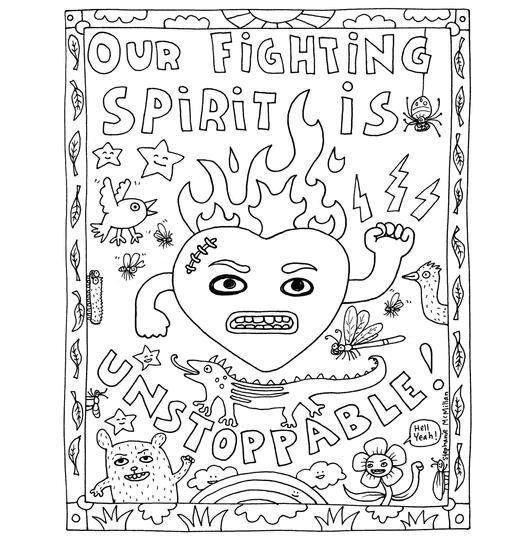
Conclusion
There is so much more that could be said. But this is a start. It is worth noting too that within Bristol alone, during the decade between the 2011 riot and the weeks of unrest of 2021, there have been numerous other cases of repression, court and imprisonment (including my own). As some of these cases remain ‘live’ and ongoing, I will leave it up to others to write on these issues (though for details of my case you can read BangUp and Smash: Women’s Prisons, Probation and Bail Hostels, 2nd Edition).
I hope that this text will help others to open up about issues connected to repression, in order to reflect. And if the words seem jarring, let me know! I want to emphasise that if these words sound spiky then they are maybe a kind of tough love, from a place of passion and care… and with a kind of gnarly optimism for future discussions.
Resignation is a symptom of repression, and the state (and all the institutions outlined at the beginning of this text) rely on this slow, insidious, creep of mistrust, weariness and despondency. Let’s examine the discontents of solidarity, so that nothing can fester there. Let’s be honest about the cycles and patterns that arise in our responses to repression.
“If power wants to extinguish revolt, it’s up to us to spread the flames." [27]
Let’s dismantle (or at least modify) the apparatus of solidarity. Let’s spread the flames through passion, not obligation.
For love, for flux, for a dialogue. For a solidarity that is laser-focused and sharp, while being open to new methods, and thinking laterally. That is messy but self-aware.
That’s the kind of solidarity I want.
ASBO December 2023
[1] Poster for Solidarity and its Discontents, Touchpaper Library December 2023
[2] ASBO Bang Up and Smash: Women’s Prisons, Probation and Bail Hostels, 2nd Edition, 2022 Download for free at https://bangupandsmash.noblogs.org/ or buy from https://www.activedistributionshop.org/product/bang-up-and-smash/
[3] Conflict is Not Abuse: Overstating Harm, Community Responsibility, and the Duty of Repair, Sarah Schulman 2016
[4] Adorno quoted in An Open Heart Points Beyond Itself Millstein https://cbmilstein.wordpress.com/2015/05/16/an-open-heart-points-beyond-itself/
[5] Complicity & Sedition Special Publication in the Face of the Trial Against Francisco and Mónica, July 2023
[6] https://www.merriam-webster.com/dictionary/discontent
[7] Armed Joy, (1977) quoted here in memory of Alfredo Bonanno (1937-2023).
[8] https://bristolabc.org/defendant-solidarity/ 27.11.23
[9] Solidarity as Weapon and Practice from Taking Sides: Revolutionary Solidarity and the Poverty of Liberalism Cindy Millstein, 2015
[10] Reprinted in Complicity & Sedition July 2023
[11] Forward Intelligence Team (police unit, used more visibly before body warn cameras and drones)
[12] Poster for Solidarity and its Discontents
[13] https://thebristolactivist.com/2023/07/26/public-inquiry-kill-the-bill-policing-say-campaigners/
[14] Millstein, Taking Sides
[15] Using the grotesque “Mutual Aid” system of policing where different forces get deployed in “public order situations” https://www.college.police.uk/app/mobilisation/mobilisation
[16] For John’s writings while in prison see https://www.brightonabc.org.uk/johnbowden.html
[17] Complicity & Sedition July 2023
[18] See Francisco Solar,A Complicit Greeting(Carcere La Gonzalina, August 2020) published in Act for Freedom Now!; see also: Alfredo M Bonanno, Locked Up,(trans. Jean Weir) Elephant Editions, 2008
[19] Quoted in Tsunami of Revenge: The Recent Riot in the Ely Neighbourhood of Cardiff, London 2023
[20] Poster for Solidarity and its Discontents
[21] Complicity & Sedition July 2023
[22] It’s worth noting that Bristol ABC used to only support anarchist prisoners, and this is no longer the case. This isn’t a judgement about this, but it is important to acknowledge that this significantly increases the number of people who are engaging with the group, and also brings with it some new challenges...
[23] For a much bigger critique of the many issues that intersect around gender and prison, and the importance of honest discussion around this, see Bang Up and Smash, 2nd Edition
[24] https://adriennemareebrown.net/2018/01/04/lets-be-brave/
[25] Gabor Maté The Myth of Normal: Trauma, Illness, & Healing in a Toxic Culture 2022 p. 25.
[26] https://bristolabc.org/defendant-solidarity/resources-and-advice/supporting-someone-through-the-legal-system/
[27] Tsunami of Revenge: The Recent Riot in the Ely Neighbourhood of Cardiff, London 2023
